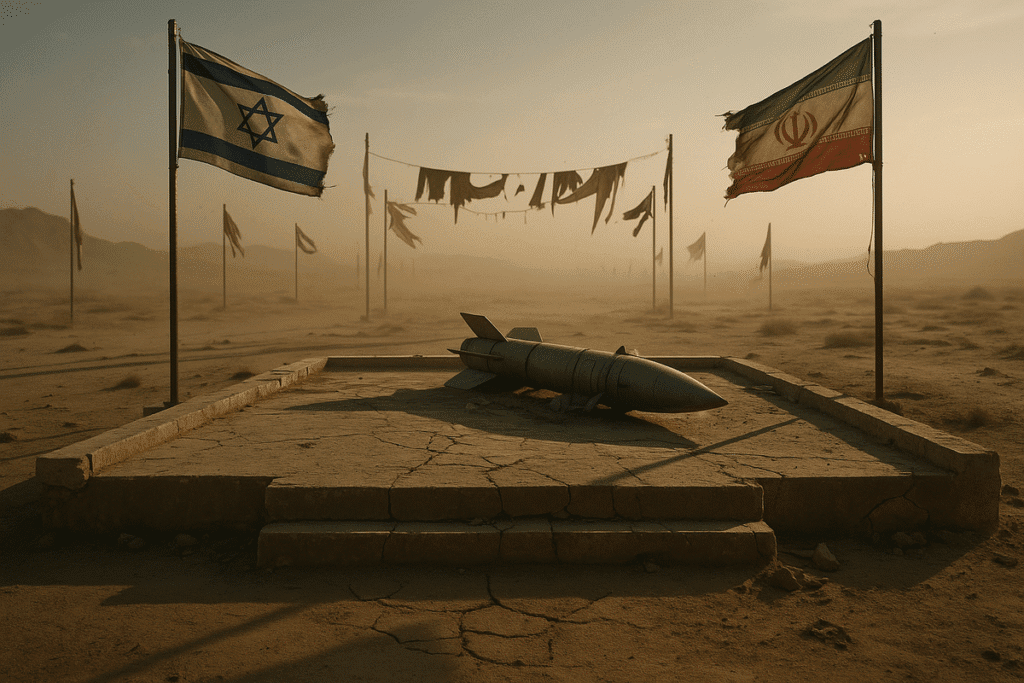“Boasting of peace before war has ended is not the mark of a strategist, but of a showman.”
— Anonymous dispatch, U.S. Army War College, 1968
The past 72 hours have revealed a presidency unmoored from reality and a foreign policy careening toward catastrophe. Donald Trump declared the total destruction of Iran’s nuclear program, demanded a Nobel Peace Prize, and then watched as Israel resumed airstrikes, Iran prepared for retaliation, and experts worldwide contradicted his claims. Intelligence assessments now confirm what surveillance could not ignore: the core components of Iran’s nuclear infrastructure remain intact. Underground tunnels, enriched uranium, and centrifuge capabilities—supposedly obliterated—were missed or left untouched. What we are witnessing is not just strategic confusion. It is the collapse of deterrence logic at the hands of a man governing by ego, not doctrine.
Deterrence, in every nuclear-era doctrine, depends on ambiguity. When a nation does not know exactly what remains, it hesitates. When leaders signal restraint paired with readiness, adversaries think twice. But Trump has erased ambiguity. He declared total victory. He claimed complete elimination of Iran’s capabilities. That removes hesitation, removes doubt, and removes the strategic fog that often prevents war. The logic of deterrence requires credibility. Trump replaced it with spectacle. And that spectacle—loud, false, and dangerous—may now trigger the very outcome it was meant to prevent.
In classic deterrence theory, strength lies not just in power but in its careful calibration. You do not provoke your adversary into desperation. You signal capacity, not chaos. But Trump’s version of power is not calibrated—it is theatrical. He announces missions before they are complete, declares victory while assessments are still pending, and lashes out when the real world refuses to follow the script. That is not strength. It is insecurity masquerading as dominance. The result is strategic incoherence, where allies improvise and adversaries adapt—and no one trusts the center to hold.
Nowhere is that clearer than in Trump’s fury at Benjamin Netanyahu. The Israeli Prime Minister, having received intelligence about Iranian targets, resumed strikes hours after Trump declared a ceasefire. Trump’s anger was not about the risk of escalation. It was about betrayal of narrative. He had written the ending: peace brokered, crisis averted, prize deserved. When reality refused to cooperate, he blamed the actors, not the director. This is not diplomacy. It is delusion. And the consequences will not be measured in applause but in fallout.
From Tehran’s perspective, the signals are deeply revealing. They see a U.S. president eager for credit, alienated from his own military briefings, and premature in his declarations. That perception alone makes circumvention more tempting. The less grounded the White House is in fact, the more room Iran has to act—quietly or boldly. This does not make conflict inevitable. But it makes the rational calculus of delay, concealment, or restraint harder to sustain. Overconfidence in Washington invites overreaction in Tehran.
The facts are not ambiguous. Iran still possesses enough enriched uranium for multiple bombs. The IAEA remains barred from full inspection. Satellite imagery shows blast craters but not tunnel collapse. Experts agree that the strikes may have delayed, but did not eliminate, Iran’s capacity. Yet Trump’s rhetoric claims otherwise—leaving Tehran an opening to deny, deceive, and reconstitute their program while the U.S. public is told the mission is over. That dissonance is not harmless. It undermines intelligence credibility and hollows out the authority of every future warning.
The cost of this spectacle is not just strategic. It is human. It poisons alliances. Israel acted unilaterally, indifferent to Trump’s narrative. The military fumed as their operations were prematurely politicized. Diplomats were sidelined. Meanwhile, Trump sought accolades for keeping oil flowing to China—oil that will fund Iran’s rearmament. The contradiction is grotesque. Praise for economic access, while claiming to halt a nuclear program those revenues support. It is not policy. It is vaudeville. But unlike vaudeville, it kills.
If Iran now acts in a visible and provocative way—through weapons testing, increased enrichment, or a visible facility announcement—Trump may feel compelled to respond not from strategy, but to preserve face. That is the risk. Escalation by miscalculation rarely begins with intent. It begins with a false narrative, an unchecked claim, or a cornered leader forced to act to defend his image. When deterrence is replaced by delusion, the danger is not distant. It is imminent.
Meanwhile, the domestic guardrails are crumbling. A DOJ official reportedly proposed ignoring court orders and proceeding with deportations under the Alien Enemies Act. This is not metaphor—it is administrative rehearsal for defying judicial oversight. The same arrogance that declares victory abroad without verification is now preparing to bypass the rule of law at home. When spectacle governs, facts are enemies. Law is noise. And power serves only itself.
We must be clear-eyed: Trump’s latest claims do not deter war. They invite it. He does not lead through strategy, but through impulse. He has reversed the logic of deterrence, replaced strength with showmanship, and transformed the risk of conflict into the proof of his vanity. What he destroys is not just policy. It is restraint, credibility, and the fragile space between provocation and war. And if we do not call it what it is, we will be called to reckon with what it becomes.

